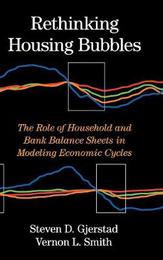
|
Rethinking Housing Bubbles: The Role of Household and Bank Balance Sheets in Modeling Economic Cycles
Hardback
Main Details
| Title |
Rethinking Housing Bubbles: The Role of Household and Bank Balance Sheets in Modeling Economic Cycles
|
| Authors and Contributors |
By (author) Steven D. Gjerstad
|
|
By (author) Vernon L. Smith
|
| Physical Properties |
| Format:Hardback | | Pages:304 | | Dimensions(mm): Height 235,Width 157 |
|
| ISBN/Barcode |
9780521198097
|
| Classifications | Dewey:338.542 |
|---|
| Audience | | Professional & Vocational | |
|---|
| Illustrations |
10 Tables, unspecified; 2 Halftones, unspecified; 50 Line drawings, unspecified
|
|
Publishing Details |
| Publisher |
Cambridge University Press
|
| Imprint |
Cambridge University Press
|
| Publication Date |
12 May 2014 |
| Publication Country |
United Kingdom
|
Description
In this highly original piece of work, Steven D. Gjerstad and Nobel Laureate Vernon L. Smith analyze the role of housing and its associated mortgage financing as a key element of economic cycles. The authors combine data from both laboratory and real markets to provide insight into the bubble propensity of real-world economic actors and use novel historical analysis on the Great Recession, the Great Depression, and all of the post-World War II recessions to establish the critical roles of housing, private-capital investment, and household and private institutional balance sheets in economic cycles. They develop a model that incorporates household balance sheets and bank balance sheets and offers insights based on this analysis concerning policy going forward, effectively changing the way economists think about economic cycles.
Author Biography
Steven D. Gjerstad is a presidential Fellow at Chapman University in Orange, California. After receiving his PhD in economics from the University of Minnesota, he worked for ten years on theoretical and computational models of market price adjustment processes and on experimental tests of those models. His work on price adjustment has appeared in Economic Theory, Games and Economic Behavior, and the Journal of Economic Dynamics and Control. In the past five years, the emphasis of his work has shifted toward an examination of adjustment processes in the aggregate economy, with an emphasis on financial crises and economic restructuring. That work has been published in the Wall Street Journal, the Critical Review, The American Interest magazine, and the Cato Journal, as well as by the National Bureau of Economic Research. Vernon L. Smith was awarded the Nobel Prize in Economic Sciences in 2002 for his groundbreaking work in experimental economics. He has joint appointments in the Argyros School of Business and Economics and the School of Law at Chapman University, and he is part of a team that will create and run the new Economic Science Institute there. Dr Smith has authored or co-authored more than 250 articles and books on capital theory, finance, natural resource economics, and experimental economics. He serves or has served on the board of editors of the American Economic Review, the Cato Journal, the Journal of Economic Behavior and Organization, the Journal of Risk and Uncertainty, Science, Economic Theory, Economic Design, Games and Economic Behavior, and the Journal of Economic Methodology. He is a past president of the Public Choice Society, the Economic Science Association, the Western Economic Association, and the Association for Private Enterprise Education. He received his PhD from Harvard University.
Reviews'This book was a pleasure to read and is highly recommended to anyone interested in financial-economic crises. It offers many intuitive stories of potential causes of the crisis, particularly the pivotal role of the housing market with historical data from the Great Recession, the Great Depression, earlier US recessions and crises in other countries, all nicely illustrated by clear time series plots and graphs and backed up by tables. The book also offers stimulating ideas for behavioral agent-based modeling of the crisis supported by insights and data from laboratory experiments.' Cars Hommes, Journal of Economic Psychology
|